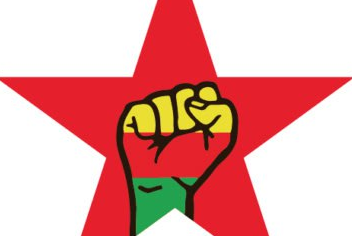
Following the developments of recent months, we as revolutionary internationalists are confronted
with various questions and contradictions that need to be analysed. First and foremost, we would like
to point out that the geopolitical situation in the wake of the imperialist wars is developing at a speed
that makes it impossible for us to make precise predictions. It is important for us to recognise and
understand what ishappening in general and to develop our next steps from this.
– The general development –
Abdullah Öcalan’s appeal calls for the dissolution and disarmament of the PKK. However, this is by no
means unconditional and is not aimed at ending the struggle, but at a process of renewal of the
movement. As a result, the military forces in the mountains have withdrawn and moved into a position
of defence. Of course, they continue to exercise their right to self-defence. “We are capable of
attacking Ankara if necessary,” as the commander Murat Karayılan clearly expressed the guerrillas’
capabilities. Meanwhile, Turkey’s attacks are not only continuing unabated, they have even intensified. The whole thing has to be understood as a process, and in order to assess it correctly, we have to look at the current situation of the guerrillas in the mountains of Kurdistan, in Rojava, but also at the overall situation in the Middle East and geopolitical developments.
A lot has happened in the Middle East in the last year and a half: the collapse of the Syrian regime and the takeover by the jihadist militias of Hay’at Tahrir al-Sham (HTS) under al-Dscholani, the genocide in Gaza by the Israeli army and its Western allies and the war in Lebanon, to name but a few. The weakening of the axis of resistance in turn led to the further isolation of the Iranian regime. The new order in the region has not yet been established.
Turkey is increasingly losing its role as the strongest regional power to the Israeli state, which in turn
is supported by US imperialism. This development raises the question for Turkey of how to position
itself in the Middle East in the future. Turkish fascism is responding to its political and economic crisis
in an attempt to close its own ranks, i.e. to strengthen its internal front. The arrest of Ekrem İmamoğlu
– the mayor of Istanbul – shows just how precarious the situation is inside Turkey. This arrest was just
the last drop of oil that ignited the anger of the masses. Since then, they have taken to the streets and
turned against Turkish fascism.
– The free mountains of Kurdistan –
The process that has been set in motion is not only the result of geopolitical developments in the
region, but also of the direct military confrontation between the Turkish state and the guerrillas.
Overall, the war situation in the mountains can be seen as a stalemate, which in itself represents a
huge success for the guerrilla forces. The guerrillas have not only managed to hold their own ground
against the second largest NATO army for several decades. It has also succeeded in developing its
strategic and operational capabilities to the point where it is able to confront the enemy offensively.
Recent successes in the field of air operations and air defence bear witness to this. The guerrillas are
also capable of operating under the enemy’s nose and penetrating its heart.
Despite numerous announcements, the Turkish army has failed to crush the guerrillas and to advance
to Kandil. It is openly showing its desperation by repeatedly attacking the guerrillas’ war tunnels with
chemical weapons. This situation has not come about overnight, but over many years. It is sufficient
proof of the ability of the armed forces to constantly evolve, not to shy away from criticism and self-
criticism and to draw consequences from them.
– The revolutionary process –
The revolutionary process unites two sides – the military and the political. One cannot exist without the
other and yet one must be the leading side. Therefore, it is important to recognise when which side
must be the leading one. A shift can open up political spaces that can be filled with content. This is the
case in Syria, for example, with the fall of the Assad regime. It remains to be seen who will prevail there and how. Basically, we trust that our friends on the ground will do everything in their power to ensure that everything that has been built and fought for in Rojava in recent years is defended with all their might.
The history of revolutionary movements also shows that the revolutionary process has more sides than the military one. Moreover, negotiations and ceasefires have always been a part of war. Dogmatic clinging to the old is bound to fail. . The art of developing the old into the new is not achieved in one fell swoop, but through a process – adapting to the circumstances while preserving the revolutionary content.
As revolutionary internationalists in Europe, we must support progressive movements worldwide with
all our strength and stand shoulder to shoulder in solidarity with all oppressed peoples in the struggle
against fascism and imperialism. We must trust in our own strength and develop our own political line.
The enemy – the war profiteers and warmongers – is still in our own country. Let us act according to
this maxim!
Widerstandsvernetzung Switzerland, March 2025